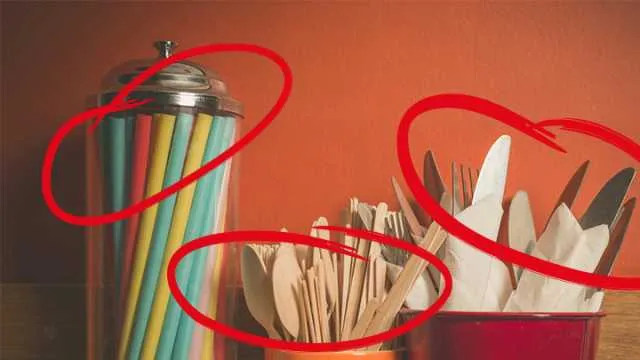
- Share on Facebook214
- Share on Pinterest
- Share on Twitter
We have a plastic problem. It’s at work, at home and even hiding in our hygiene products in the form of tiny beads. When it comes to pollution on a global scale, there’s no doubt that plastic is one of the biggest offenders. Here are 27 easy trades you can make in order to use less plastic in your daily life.
Plastic bags
More than one million plastic bags are used every minute. Sadly, most of the time, they are only used once. Once they are tossed into a landfill, a single plastic bag can take 1,000 years to biodegrade. If they aren’t tossed properly and make their way into the ocean, a plastic bag can trap and harm marine animals.
What to use instead: reusable bags made of canvas, cotton or hemp
Plastic straws
Among single-use plastic items, these are some of the worst. Each day, humans use more than 500 million straws worldwide. Typically, after a short 30-minute stint in a drink, they end up in the ocean and confuse marine life, who mistake it for food. You wouldn’t knowingly eat plastic, would you? Then please don’t make marine animals do it. The next time you’re at a restaurant or bar, make sure to say, “No staw, please!”
What to use instead: cardboard or glass straws, or none at all
Coffee cups
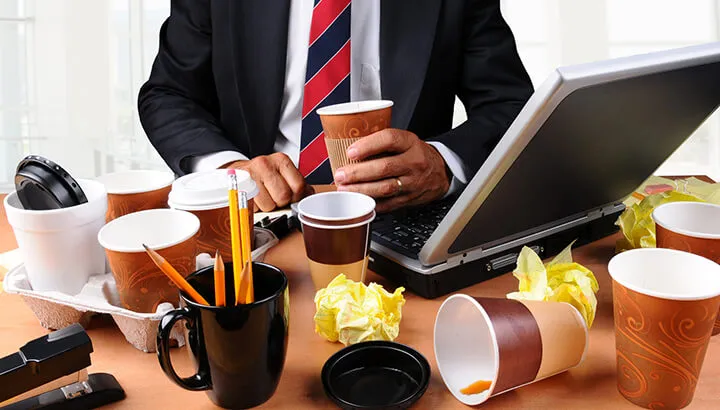
They may look like paper, but disposable coffee cups are usually lined with polyethylene, a type of resin made from plastic. Just one coffee cup a day produces about 23 pounds of waste every year — and that’s just for one coffee a day! The average office worker in the U.S. actually tosses about 500 a year, which is more than once a day. As the leading consumers of coffee in the world, Americans take up a big piece of the pollution pie.
What to use instead: reusable coffee mugs
Plastic water bottles
They may be convenient, but U.S. landfills are overflowing with single-use water bottles. Beyond pollution, studies show that toxic chemicals can leak into bottled water over time. So if you’re not using BPA-free plastic, you may be hurting your health.
What to use instead: reusable water bottles
Plastic silverware
With so many of us working long hours, it can be tempting to eat take out food all the time and use plastic silverware. But those small pieces of plastic become even smaller when they get into the ocean. Microplastics then get eaten by fish at an alarming rate. And if the fish are eating them, and you’re eating the fish… well, you get the idea. Plastic for dinner? No thanks!
What to use instead: metal silverware or wooden chopsticks
Plastic food containers
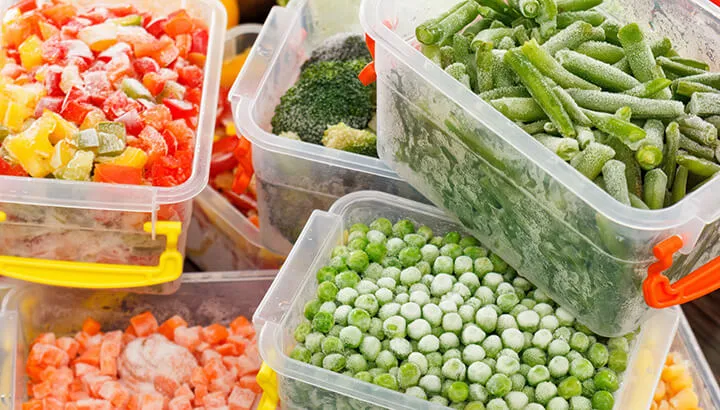
This one directly impacts your health. When you store your leftovers in plastic food containers, BPA can leach into your food, especially when reheated. BPA is an estrogen mimicker that poses a significant health risk to children. Canada already banned it — so what are we waiting for? It’s time to ditch the plastic containers for good.
What to use instead: mason jars, stainless steel or aluminum containers
Plastic wrap
When we’re cooking large meals for our families, plastic wrap seems like the most inventive way to keep food fresh in the refrigerator. However, it’s not actually recyclable, meaning it’s bound for a landfill as soon as it leaves your kitchen. Lame!
What to use instead: Bee’s wrap, Abeego wrap, wax paper, aluminum foil (you can reuse it later), fabric bowl covers, cloth, two plates
Plastic storage containers
We live in a society driven by consumer goods, and many of us have run out of space for all of our knick-knacks. If this is you, please don’t buy plastic storage containers. They contribute to emissions during the manufacturing process, directly polluting our earth’s atmosphere and the air we breath.
What to use instead: cardboard boxes, wire shelves, metal drawers and canvas bins. You can also consider embracing a minimalist lifestyle and making a few extra bucks from a garage sale.
Packaged produce
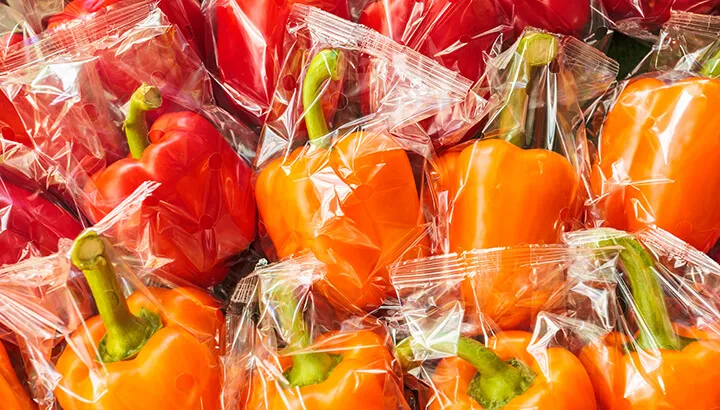
Triple-washed, plastic-wrapped baby greens may seem uber convenient, but that’s just another piece of plastic that may end up in the ocean. And we don’t need any more! By 2050, experts believe there will be more plastic in the ocean by weight than fish. Scary!
What to use instead: buy loose fruits and vegetables. As an added bonus, you’ll only buy what you need, so you’ll reduce your overall food waste. Eventually, you may even venture into growing your own food at home. It’s easier than you think, plus, you won’t have to worry about pesticides.
Frozen dinners
Those entrees are always wrapped in plastic, then heated up in the microwave. We already talked about plastic chemicals leaching into food, but that’s not the only reason to give up packaged dinners. Pre-made food items contain harmful additives, preservatives, food coloring and loads of sugar. Junk, junk and more junk.
What to use instead: Fresh, whole ingredients. Choose recipes with staying power, so you’ll have dinner for four to five days after you cook.
Packaged dry goods
Rice, grains, dried fruits and nuts are a healthy part of a balanced diet. However, they’re not always that kind to the earth. Pre-packaged dry goods almost always come wrapped in plastic bags, and they may not even be the amount you’re looking for. Such a waste!
What to use instead: food from bulk bins, stored in a cloth bag
Deodorant
Apart from the plastic packaging, conventional deodorants contain all sorts of nasty chemicals, like aluminum. Deodorants have been linked to health issues like hormone disruption, breast cancer, Alzheimer’s disease and kidney problems.
What to use instead: homemade toxin-free deodorant stored in a glass jar. You can also put baking soda under your armpits.
More ideas to reduce your plastic use
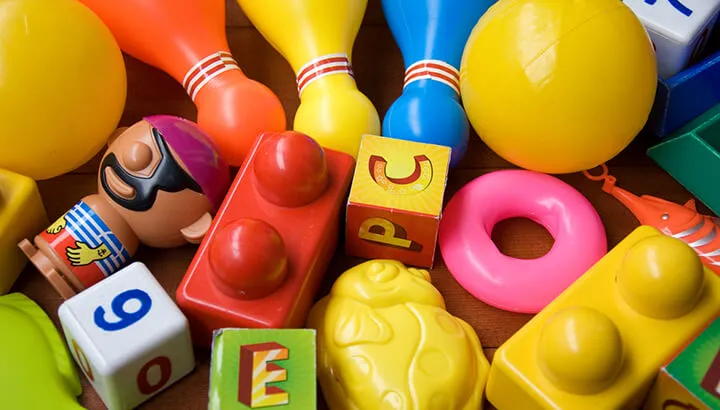
- Trade plastic lighters for matches or refillable metal lighters, like Zippo.
- Swap plastic toothbrushes for an eco-friendly bamboo variety.
- Ditch store-bought laundry detergent in a plastic bottle for soap nuts or homemade laundry detergent.
- Forget your plastic kitchen sponge and use a cotton washcloth for dishes.
- Avoid plastic shampoo bottles with this homemade rosemary and peppermint shampoo recipe stored in a jar.
- Compliment your homemade shampoo with a DIY conditioner that uses apple cider vinegar to treat your scalp.
- Stop buying plastic containers of toothpaste and make your own instead.
- Skip plastic bottles of lotion for this magnesium lotion recipe.
- Avoid toxic air fresheners in plastic containers and use soy or beeswax candles (not paraffin), essential oils or matches (for the bathroom).
- Refrain from buying plastic toys for your kids and consider wooden toys and coloring books instead.
- Forgo wasteful plastic diapers and try out reusable cloth diapers on your little one.
- Avoid buying plastic spray bottles full of toxic cleaning chemicals and use homemade cleaning solutions. We use white vinegar for everything!
- Switch from disposable razors to reusable razors so you toss fewer plastic handles.
- Stop throwing away plastic tampon applicators every month and consider a Diva Cup. It’ll give you 12 hours of leak-free protection without all the plastic waste.
- Ditch sugar-filled gum, which is made from synthetic rubber (a.k.a. plastic) and chew on fresh mint leaves for better breath.
Before you throw your plastic away…
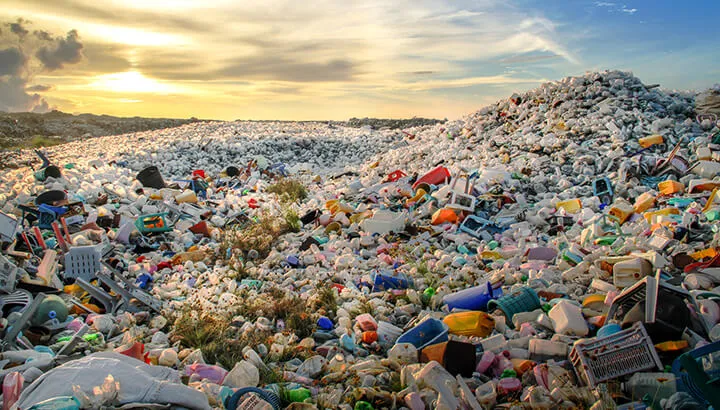
We always justify our plastic use by saying, “Hey, at least it’s recyclable.” But the truth is, only 10 percent of plastic items ever go through the recycling process. So, before you toss your plastic items in the recycling or trash bin hoping for the best, consider selling them on eBay or Craigslist. You can also upcycle them, donate them or check out TerraCycle to see if they can take your trash off your hands in a sustainable way.
When it comes to global issues, we often get overwhelmed and think we can’t do anything — but that’s not the case! These suggestions to reduce plastic use may seem small, but they’ll have a big impact in the long run, especially for the generations after us. Do your best to turn your home into a plastic-free zone and enjoy the peace of mind of a greener lifestyle.
— The Alternative Daily
- Share on Facebook214
- Share on Pinterest
- Share on Twitter

